Abstract
The present study investigated the effects of brief (20 min), acute (2 hr) and chronic restraint stress (2 hr/day for five days) at the time of dark onset on macronutrient selection in female Wistar rats. The role of 5-HT1A receptors in nutrient intake was also examined in a dose-response study (100–700 μg/kg body weight) of 8-hydroxy-2-(di-n-propylamino) tetralin (DPAT) in an acute restraint model. A total of 200 rats aged 6-12 months were tested. In all cases, the restraint stress took the form of confinement within tight-fitting cylinder tubes. In the brief and acute paradigms, the intake of pure carbohydrate (CHO), protein (PRO), and fat was measured for 40 min after a single exposure to stress; in the chronic model, nutrient intake was assessed for 40 min only after the final restraint stress session on day 5. In the DPAT paradigm, intraperitoneal injections of the 5-HT1A agonist were given prior to acute restraint and a 40 min session of nutrient self-selection. Statistical analysis using the t-test for independent samples revealed that neither PRO nor total intake was significantly altered by restraint in the brief, acute or chronic restraint experiments, whereas CHO consumption was suppressed by acute (p=0.02) and chronic restraint (p=0.021), and fat intake was suppressed by brief (p=0.010), acute (p=0.002) and chronic restraint (p=0.001). In the DPAT paradigm, acute restraint stress suppressed CHO (p=0.0001), fat (p=0.000001) and total intake (p=0.003). These effects were not reversed by DPAT, and the administration of 300 μg/kg actually further reduced fat intake. In conclusion, fat intake is more sensitive to the suppressive effects of restraint stress than CHO intake, whereas protein intake is unaffected. Furthermore, 5-HT1A receptors do not seem to play a role in the effects of acute restraint on CHO and fat intake.
Similar content being viewed by others
References
Barlow D.H., Durand V.M.: Eating disorders. In: Taflinger M., Tinsley J., Lamb P., Clark M. (Eds.), Abnormal Psychology. Pacific Grove, Brooks/Cole Publishing Company, 1995, pp. 299–326.
Donohoe T.P.: Stress-induced anorexia: implications for anorexia nervosa. Life Sci., 34, 203–218, 1984.
Rutledge T., Linden W.: To eat or not to eat: affective and physiological mechanism in the stress-eating relationship. J. Behav. Med., 21, 221–240, 1998.
Shimizu N., Oomura Y., Kai Y.: Stress-induced anorexia in rats mediated by serotonergic mechanisms in the hypothalamus. Physiol. Behav., 46, 835–841, 1989.
Marti O., Marti J., Armario A.: Effects of chronic stress on food intake in rats: influence of stressor intensity and duration of daily exposure. Physiol. Behav., 55, 747–753, 1994.
Ely D.R., Dapper V., Marasca J., Correa J.B., Gamaro G.D., Xavier M.H., Michalowski M.B., Catelli D., Rosat R., Ferreira M.B.C., Dalmaz C.: Effect of restraint stress on feeding behaviour of rats. Physiol. Behav., 61, 395–398, 1997.
Zurita A., Murua S., Molina V.: An endogenous opiate mechanism seems to be involved in stress-induced anhedonia. Eur. J. Pharmacol., 299, 1–7, 1996.
Rybkin I.I., Zhou Y., Volaufova J., Smagin G.N., Ryan D.H., Harris R.B.: Effect of restraint stress on food intake and body weight is determined by time of day. Am. J. Physiol., 273, R1612–R1622, 1997.
Kalat J.W.: Biological psychology. Pacific Grove, Brooks/Cole Publishing Company, 1995.
Pinel J.J.: Biopsychology. Needham Heights, Allyn & Bacon, 1997.
Brewerton T.D.: Toward a unified theory of serotonin dysregulation in eating and related disorders. Psychoneuroendocrinology, 20, 561–590, 1995.
Dourish C.T., Hutson P.H., Curzon G.: Low doses of the putative serotonin agonist 8-hydroxy-2-(di-n-propylamino)tetralin (8-OH-DPAT) elicit feeding in the rat. Psychopharmacology, 86, 197–204, 1985.
Samanin R., Garattini S.: Serotonin and the pharmacology of eating disorders. Ann. N. Y. Acad. Sci., 575, 194–207, 1989.
Leibowitz S.F., Weiss G.F., Walsh U.A., Viswanath D.: Medial hypothalamic serotonin: role in circadian patterns of feeding and macronutrient selection. Brain Res., 503, 132–138, 1989.
Ericsson M., Poston W.S. 2nd, Foreyt J.P.: Common biological pathways in eating disorders and obesity. Addict. Behav., 21, 733–743, 1996.
Islam A.K., Dougherty T., Koch J.E., Bodnar R.J.: Naltrexone, serotonin receptor subtype antagonists, and carbohydrate intake in rats. Pharmacol. Biochem. Behav., 48, 193–201, 1994.
Mullen B.J., Martin R.J.: The effect of dietary fat on diet selection may involve central serotonin. Am. J. Physiol. 263, R559–R563, 1992.
Blundell J.E., Lawton C.L.: Serotonin and dietary fat intake: Effects of dexfenfluramine. Metabolism, 44, 33–37, 1995.
Wurtman R.J., Fernstrom J.D.: Control of brain neurotransmitter synthesis by precursor availability and nutritional state. Biochem. Pharmacol., 25, 1691–1696, 1976.
Turner M.S., Foggo M., Bennie J., Carroll S., Dick H., Goodwin G.M.: Psychological, hormonal and biochemical changes following carbohydrate bingeing: a placebo controlled study in bulimia nervosa and matched controls. Psychol. Med., 21, 123–l33, 1991.
Leibowitz S.F., Alexander IT., Cheung W.K., Weiss G.F.: Effects of serotonin and the serotonin blocker metergoline on meal patterns and macronutrient selection. Pharmacol. Biochem. Behav., 45, 185–194, 1993.
Yamada S., Watanabe A., Nankai M., Toru M.: Acute immobilization stress reduces (+/−) DOI-induced 5-HT2A receptor-mediated head shakes in rats. Psychopharmacology, 119, 9–14, 1995.
Grignaschi G., Mantelli B., Samanin R.: The hypophagic effect of restraint stress in rats can be mediated by 5-HT2 receptors in the paraventricular nucleus of the hypothalamus. Neurosci. Lett., 152, 103–106, 1993.
Fdez Espejo E., Gil E.: Single restraint stress sensitizes acute chewing movements induced by haloperidol, but not if the 5-HT1A agonist 8-OH-DPAT is given prior to stress. Brain Res., 755, 351–355, 1997.
Wesemann W., Weiner N.: Circadian rhythm of serotonin binding in rat brain. Prog. Neurobiol., 35, 405–428, 1990.
Saphier D., Welch J.E.: Effects of the serotonin1A agonist, 8-hydroxy-2-(di-n-propylamino) tetralin on neurochemical responses to stress. J. Neurochem., 64, 767–776, 1995.
Keim K.L., Sigg E.B.: Physiological and biochemical concomitants of restraint stress in rats. Pharmacol. Biochem. Behav., 4, 289–297, 1976.
Kennett G.A., Chaouloff F., Marcou M., Curzon G.: Female rats are more vulnerable than males in an animal model of depression: Possible role of serotonin. Brain Res., 382, 416–421, 1986.
Author information
Authors and Affiliations
Corresponding author
Rights and permissions
About this article
Cite this article
Wang, S.W. Effects of restraint stress and serotonin on macronutrient selection: A rat model of stress-induced anorexia. Eat Weight Disord 7, 23–31 (2002). https://doi.org/10.1007/BF03354426
Received:
Accepted:
Published:
Issue Date:
DOI: https://doi.org/10.1007/BF03354426




